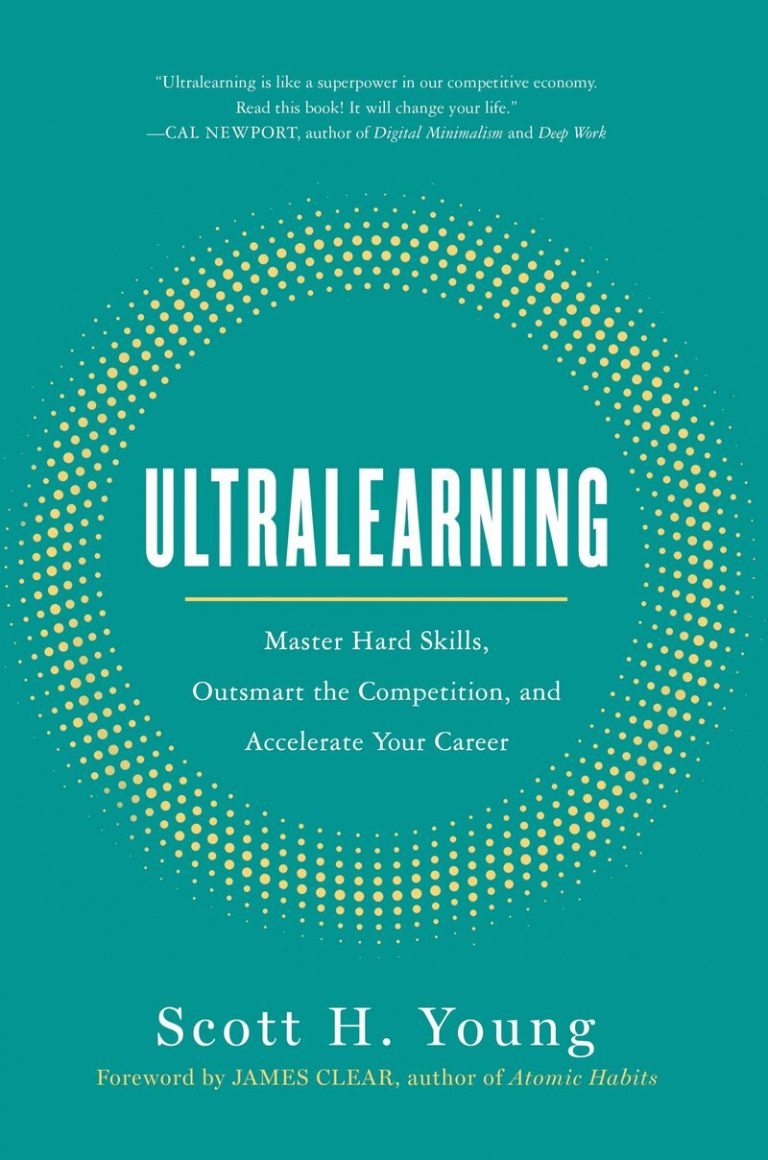Ultralearning: A strategy for acquiring skills and knowledge that is both self-directed and intense.
In Ultralearning: Master Hard Skills, Outsmart the Competition, and Accelerate Your Career, author Scott Young argues that learning a new talent, staying relevant, reinventing yourself, and adapting to whatever the workplace throws your way is a surefire way to becoming successful.
Ultralearning offers nine principles to master hard skills quickly.
Young incorporates the latest research about the most effective learning methods and the stories of other ultralearners like himself—among them Benjamin Franklin, chess grandmaster Judit Polgár, and Nobel laureate physicist Richard Feynman, as well as a host of others, such as little-known modern polymath Nigel Richards, who won the French World Scrabble Championship—without knowing French.
Profiled Ultralearners:
- Benny Lewis, who quickly acquires new languages through fearless immersion.
- Eric Barone, who became a millionaire nearly overnight after patiently acquiring all the skills to develop his own game.
- Tristan de Montebello, who went from near-zero experience to a finalist for the World Champion of Public Speaking in seven months.
- Nigel Richards, who became the French Scrabble World Champion, without speaking French.
A four-year degree used to be an assurance of a decent job. Now it is barely a foot in the door. The best careers demand sophisticated skills that you’re unlikely to stumble upon by chance. Not just programmers but managers, entrepreneurs, designers, doctors, and nearly every other profession is rapidly accelerating the knowledge and skills required, and many are struggling to keep up.
Despite their idiosyncrasies, the ultralearners had a lot of shared traits. They usually worked alone, often toiling for months and years without much more than a blog entry to announce their efforts. Their interests tended toward obsession. They were aggressive about optimizing their strategies, fiercely debating the merits of esoteric concepts such as interleaving practice, leech thresholds, or keyword mnemonics. Above all, they cared about learning. Their motivation to learn pushed them to tackle intense projects, even if it often came at the sacrifice of credentials or conformity.
Ultralearning isn’t easy. It’s hard and frustrating and requires stretching outside the limits of where you feel comfortable. However, the things you can accomplish make it worth the effort.
Ultralearning: A strategy for acquiring skills and knowledge that is both self-directed and intense.
Your deepest moments of happiness don’t come from doing easy things; they come from realizing your potential and overcoming your own limiting beliefs about yourself. Ultralearning offers a path to master those things that will bring you deep satisfaction and self-confidence.
With the disappearance of medium-skilled jobs, it’s not enough to get a basic education and work hard every day in order to succeed. Instead, you need to move into the higher-skilled category, where learning is constant, or you’ll be pushed into the lower-skilled category at the bottom. Underneath this unsettling picture, however, there is also hope. Because if you can master the personal tools to learn new skills quickly and effectively, you can compete more successfully in this new environment. That the economic landscape is changing may not be a choice any of us has control over, but we can engineer our response to it by aggressively learning the hard skills we need to thrive.
Ultralearning, because it is directed by learners themselves, can fit into a wider variety of schedules and situations, targeting exactly what you need to learn without the waste.
Ultralearning is a potent skill for dealing with a changing world. The ability to learn hard things quickly is going to become increasingly valuable, and thus it is worth developing to whatever extent you can, even if it requires some investment first.
The best ultralearners are those who blend the practical reasons for learning a skill with an inspiration that comes from something that excites them.
Principles of Becoming an Ultralearner
Ultralearning isn’t a cookie-cutter method. Every project is unique, and so are the methods needed to master it. The uniqueness of ultralearning projects is one of the elements that ties them all together. If ultralearning could be bottled or standardized, it would simply be an intense form of structured education. What makes ultralearning interesting is also what makes it hard to boil down into step-by-step formulas.
There are nine universal principles that underlie the ultra learning projects described so far. Each embodies a particular aspect of successful learning
- METALEARNING: FIRST DRAW A MAP. Start by learning how to learn the subject or skill you want to tackle. Discover how to do good research and how to draw on your past competencies to learn new skills more easily.
- FOCUS: SHARPEN YOUR KNIFE. Cultivate the ability to concentrate. Carve out chunks of time when you can focus on learning, and make it easy to just do it.
- DIRECTNESS: GO STRAIGHT AHEAD. Learn by doing the thing you want to become good at. Don’t trade it off for other tasks, just because those are more convenient or comfortable.
- DRILL: ATTACK YOUR WEAKEST POINT. Be ruthless in improving your weakest points. Break down complex skills into small parts; then master those parts and build them back together again.
- RETRIEVAL: TEST TO LEARN. Testing isn’t simply a way of assessing knowledge but a way of creating it. Test yourself before you feel confident, and push yourself to actively recall information rather than passively review it.
- FEEDBACK: DON’T DODGE THE PUNCHES. Feedback is harsh and uncomfortable. Know how to use it without letting your ego get in the way. Extract the signal from the noise, so you know what to pay attention to and what to ignore.
- RETENTION: DON’T FILL A LEAKY BUCKET. Understand what you forget and why. Learn to remember things not just for now but forever.
- INTUITION: DIG DEEP BEFORE BUILDING UP. Develop your intuition through play and exploration of concepts and skills. Understand how understanding works, and don’t recourse to cheap tricks of memorization to avoid deeply knowing things.
- EXPERIMENTATION: EXPLORE OUTSIDE YOUR COMFORT ZONE. All of these principles are only starting points. True mastery comes not just from following the path trodden by others but from exploring possibilities they haven’t yet imagined.
Ultralearning is a skill, just like riding a bicycle. The more practice you get with it, the more skills and knowledge you’ll pick up for how to do it well. This long-term advantage likely outweighs the short-term benefits and is what’s easiest to mistake for intelligence or talent when seen in others.
“Why?,” “What?,” and “How?”
“Why?” refers to understanding your motivation to learn. If you know exactly why you want to learn a skill or subject, you can save a lot of time by focusing your project on exactly what matters most to you.
“What?” refers to the knowledge and abilities you’ll need to acquire in order to be successful. Breaking things down into concepts, facts, and procedures can enable you to map out what obstacles you’ll face and how best to overcome them.
“How?” refers to the resources, environment, and methods you’ll use when learning. Making careful choices here can make a big difference in your overall effectiveness.
Benchmarking
The way to start any learning project is by finding the common ways in which people learn the skill or subject. This can help you design a default strategy as a starting point.
The 10 Percent Rule
A good rule of thumb is that you should invest approximately 10 percent of your total expected learning time into research prior to starting. If you expect to spend six months learning, roughly four hours per week, that would be equal to roughly one hundred hours, which suggests that you should spend about ten hours, or two weeks, doing your research.
Directness
Directness is the idea of learning being tied closely to the situation or context you want to use it in.
The easiest way to learn directly is to simply spend a lot of time doing the thing you want to become good at. If you want to learn a language, speak it, as Benny Lewis does. If you want to master making video games, then make them, as Eric Barone does. If you want to pass a test, practice solving the kinds of problems that are likely to appear on it.
When we learn new things, therefore, we should always strive to tie them directly to the contexts we want to use them in. Building knowledge outward from the kernel of a real situation is much better than the traditional strategy of learning something and hoping that we’ll be able to shift it into a real context at some undetermined future time.
Retrieval Practice
Benjamin Franklin practiced his writing by reconstructing essays from memory. Mary Somerville worked through problems mentally when no candle was available for night reading. Roger Craig practiced trivia questions without looking at the answers. Retrieval is not a sufficient tool to create genius, but it may be a necessary one.
All the Best in your quest to get Better. Don’t Settle: Live with Passion.



1 Comment
Pingback: 100 Books Reading Challenge 2021 | Lanre Dahunsi